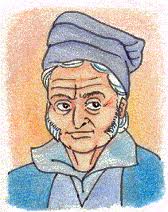I am the very model of a modern Major-General,/ I've information vegetable, animal, and mineral/...I'm very well acquainted too with matters mathematical,/ I understand equations, both the simple and quadratical....
--Major General Stanley, in Gilbert and Sullivan's operetta The Pirates of Penzance
If you have ever flown in an airplane, used a mobile phone, played a DVD, or listened to the radio, you have benefited from a special form of mathematical magic called the quadratic equation. Today marks the 546th birthday of the man whose work ultimately led us to the quadratic. Yet, due to his own reticence, Scipione del Ferro received no recognition during his lifetime and very little to this day. His story brings to my mind one of the “Three Jewels of Taoism,” that of Bugan wei tianxia xian (Modesty).
Bugan wei tianxia xian appears in the Tao Te Ching in chapter 67, where Lao Tzu lays out his “Three Treasures,” the virtue teachings he felt had the most practical application to political life:
Here are my three treasures. Guard and keep them! The first is pity; the second, frugality; the third, refusal to be 'foremost of all things under heaven'.
For only he that pities is truly able to be brave;
Only he that is frugal is able to be profuse.
Only he that refuses to be foremost of all things
Is truly able to become chief of all Ministers.
At present your bravery is not based on pity, nor your profusion on frugality, nor your vanguard on your rear; and this is death. But pity cannot fight without conquering or guard without saving. Heaven arms with pity those whom it would not see destroyed.
I find it interesting that while the first virtue (Ci/Compassion) and the second (Jian/Moderation) appear as single, pithy words, the third virtue appears as this lengthy, hard-to-translate phrase. Various scholars have rendered this idea into English as “not presuming to be at the forefront in the world” (Henricks) or “not daring to put myself ahead of everybody” (Muller); others have suggested simpler expressions, such as Modesty (Balfour) or Humility (Wieger).
A modern translator of the Tao Te Ching, Ellen M. Chen, gives a more detailed explanation of this virtue:
The third treasure, daring not to be at the world’s front, is the Taoist way to avoid premature death. To be at the world’s front is to expose oneself, to render oneself vulnerable to the world’s destructive forces, while to remain behind and to be humble is to allow oneself time to fully ripen and bear fruit. This is a treasure whose secret spring is the fear of losing one’s life before one’s time. This fear of death, out of a love for life, is indeed the key to Taoist wisdom.
 |
| del Ferro |
So: Bugan wei tianxia xian. Does it represent Prudence and appropriate Deference as to one’s place in the world, or cowardice and paralysis? One can say the Taoist sees wisdom in “living to fight another day,” but then again, “Nothing ventured, nothing gained.”
The Greek philosopher Aristotle again may offer us a solution in the Nicomachean Ethics, where he exalts a Middle Way of Andreia (Courage), lying somewhere between inappropriate overconfidence (thrasus) and deficient self-confidence (deilos). Bugan wei tianxia xian may represent the Andreia that avoids overconfidence, while Mannaz the aspect that avoids meekness. Two faces, but one root virtue.
This brings us to del Ferro, whose story raises the question of confidence. The son of a papermaker, del Ferro probably studied at the University of Bologna. I say “probably” because none of del Ferro’s writings survive. We know he lectured at the University in arithmetic and geometry, because others have described his work. His son-in-law Hannibal Nave inherited a famed notebook from del Ferro, which, like Leonardo DaVinci’s, recorded the wondrous workings of del Ferro’s mind. The only reason he received credit for solving the cubic equation, forerunner of the quadratic, is because two later mathematicians, Gerolano Cardano and Ludivico Ferrari, visited Nave and read the notebook.
Apparently del Ferro preferred to share his work with only a few close friends and associates. Did a lack of Confidence drive this? Or Wiliness?
Much like the magicians in R.K. Rowling’s Harry Potter books, the mathe-magicians of medieval Italy would challenge each other to public duels, in which one math wizard would pose a math problem to the other. If the opponent could not solve it, the instigator would win, and the loser might lose their funding and university tenure. (Tough bunch, these mathematicians!) Thus, historians suspect del Ferro kept the solution of the cubic equation as a sort of “secret weapon,” in case he ever faced a challenge.
So, it seems del Ferro indeed may have shown the Savvy the Taoist Masters praised in the principle of never going first, Bugan wei tianxia xian. Many lament that the loss of his notebook of secrets relegated him to even greater obscurity than might have been true. But, he lived out his days as he wished, secure in his station--just as the wisdom of the Tao would have it.
What talents or gifts might you be holding secret? Are you, as a Taoist master might say, waiting to let yourself ripen? How do you pick your time to shine forth? Does the talent you hold latent raise your Confidence?
May we see the gates of Bugan wei tianxia xian, and perhaps make a home there.

No comments:
Post a Comment